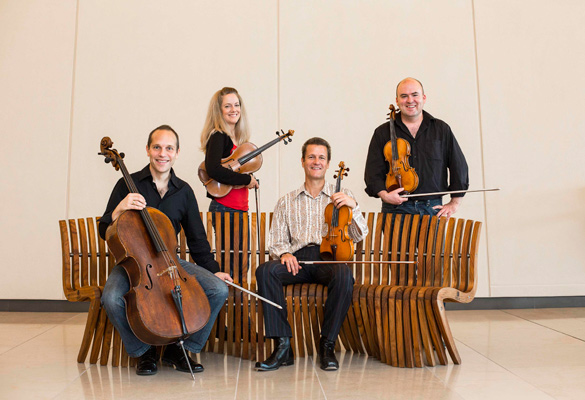 St. Lawrence String Quartet. Courtesy photo
St. Lawrence String Quartet. Courtesy photoSFPM News:
Santa Fe Pro Musica presents the world-class St. Lawrence String Quartet in performance 3 p.m. Oct. 5 at St. Francis Auditorium, New Mexico Museum of Art, 107 W. Palace Ave.
Tickets are $20, $35, $45 and $65 and available at the Santa Fe Pro Musica Box Office 505.988.4640, The Lensic 505.988.1234 or online www.santafepromusica.com.
This October, the vivid colors of fall will mingle with the vivid colors of music as Santa Fe Pro Musica presents the world-class St. Lawrence String Quartet performing works of Haydn, Golijov, and Beethoven. The St. Lawrence String Quartet’s mission: bring every piece of music to the audience in vivid color, with pronounced communication and teamwork, and great respect to the composer.
The Quartet consists of Geoff Nuttall, violin; Mark Fewer, violin; Lesley Robertson, viola;and Christopher Costanza, cello.
The St. Lawrence String Quartet (SLSQ) has established itself among the world-class chamber ensembles of its generation. Its mission: bring every piece of music to the audience in vivid color, with pronounced communication and teamwork, and great respect to the composer. Since winning both the Banff International String Quartet Competition and Young Concert Artists International Auditions in 1992, the quartet has delighted audiences with its spontaneous, passionate, and dynamic performances.
Alex Ross of the New Yorker magazine writes, “… the St. Lawrence are remarkable not simply for the quality of their music making, exalted as it is, but for the joy they take in the act of connection.”
Since 1998 the SLSQ has held the position of Ensemble in Residence at Stanford University. In addition to their appointment at Stanford, the SLSQ are visiting artists in residence at Arizona State University at Tempe.
Lesley Robertson and Geoff Nuttall are founding members of the group, and hail from Edmonton, Alberta, and London, Ontario, respectively. Christopher Costanza is from Utica, N.Y. and joined the group in 2003. Mark Fewer, a native of Newfoundland, begins his first season with the quartet in 2014, succeeding violinist Scott St. John. All four members of the quartet live and teach at Stanford, in the Bay Area of California.
The Program:
String Quartet in F Minor, Op. 20, No. 5
In the mid-eighteenth century, a literary movement developed in Germany known as Sturm und Drang (“storm and stress” or sometimes called “drama and trauma”), a reaction against the charming, courtly, lighter style of the preceding Rococo period. There is no evidence Haydn consciously used Sturm und Drang concepts as a compositional force in his music written during the mid to late 18th century, however one can perceive the influence of these trends on his music, including employment of the somber minor keys, angular and tortured melodic contours, exploration of darker subjects, and experimentation with dramatic and unexpected musical changes and contrasts.
Qohelet
Golijov grew up in an Eastern European Jewish household in La Plata, Argentina. As a child he was surrounded by classical, Jewish liturgical and klezmer music, and the tango music of Astor Piazzolla. In 1983 Golijov moved to Jerusalem where he immersed himself in the “colliding musical traditions of that city.” In 1986 he moved to the United States where he is currently Loyola Professor of Music, College of the Holy Cross (Worcester, MA). He has received many honors and awards including two Grammy awards, a MacArthur Fellowship “Genius Grant,” a Guggenheim Fellowship and Musical America Composer of the Year (2006).
Golijov’s string quartet Qohelet (2011) is inspired by one of the most frequently quoted phrases from the Bible’s book of Ecclesiastes (Kohelet, in Hebrew): “What has been will be again/What has been done will be done again/There is nothing new under the sun.”
String Quartet in C Major, Op. 59, No. 3 “Razumovsky”
Beethoven composed the three famous and much loved Razumovsky String Quartets, Op. 59 in 1805-1806 for the Russian ambassador to the Court of Vienna, Prince Andrei Razumovsky (1752-1836). Appearing only a few years after Beethoven’s earlier Opus 18 string quartets (1801), which still owe much to Haydn and Mozart, the three Razumovsky Quartets are works of a completely different nature; quartets with symphonic dimensions.

